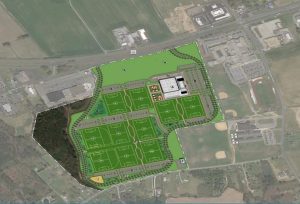
BERLIN – A sports complex that features indoor and outdoor facilities on Route 50 in Berlin is estimated to cost at least $153 million in today’s marketplace, according to a report released this week.
The Maryland Stadium Authority (MSA) on Monday released the much-anticipated study update commissioned by the Town of Ocean City for $49,400 regarding a proposed indoor fieldhouse and outdoor field complex at the Berlin site being considered by Worcester County for a sports complex. The study looks at the costs and impacts of a sports complex consisting of eight to 10 tournament quality fields and a 125,000 square foot indoor facility.
“MSA’s role in managing studies is to provide unbiased and objective analysis which provides information to local officials to assist in the decision-making process about investment and benefits for their communities and constituents,” a synopsis of the study reads.
While a sports complex has been a topic of discussion among local officials since at least 2017, the process took a big step forward this spring when the Worcester County Commissioners voted 4-3 to pursue the purchase of 95 acres adjacent to Stephen Decatur High School for $7.1 million. At that point, the Town of Ocean City approached the MSA to seek an update to a 2020 Crossroads Consulting market and economic analysis related to a sports complex. MSA released the updated study, which looks at the Route 50 site specifically, this week. The new document includes updated market research, existing sports facilities in the region, a conceptual site plan and an estimate of related revenues. The MSA lists as key findings:
— Demand exists for both the indoor and outdoor components of the sports complex
— The indoor fieldhouse would account for 48% of estimated fiscal and economic impacts while the outdoor fields would account for 52%
— The proposed site has sufficient capacity and “is generally considered to be adequate to excellent” based on “physical site factors, vehicular/pedestrian access and contextual design issues”
— The sports complex would likely operate at a deficit, “which is not unlike other facilities that are built for their ability to generate economic activity”
— The sports complex could host tournament activity as well as county sports programs
As far as economic activity, the report looks at tournament frequency and potential local revenue generated as a result. With a range of 54 to 64 tournaments a year, the sports complex is projected to generate 93,700 to 111,100 net new local room nights. Number of participants on an annual basis estimated from 54,110 to 64,070 with spectators varying between 115,220 and 136,540.
“The estimated gross tax revenues generated from ongoing operations of the Sports Complex is estimated to be between $8.5 million to $10.1 million in a stabilized year of operation,” the MSA synopsis reads. “Net new tax revenue is estimated to be between $6.6 million and $7.8 million with $1.7 million to $2.0 million net new to the local and $4.9 million to $5.8 million new to the State.”
According to the report, the gross tax (local and state) could support debt service between $142 million and $169 million of 20-year revenue bonds. The potential contribution amount for the complex is projected at $31 to $36.5 million from local sources and somewhere between $111 million to $132.5 million from the state.
The report’s findings are based on a variety of assumptions. While one major assumption is the location on Route 50 next to the high school, others include that it’s operated by people who specialize in managing similar facilities and that it’s aggressively marketed.
As far as construction costs, the report shows cost savings if the indoor and outdoor components of the proposed facility are built simultaneously. The outdoor fields are expected to cost $67.6 million while the indoor costs are estimated at $91.2 million. If both are built together, the estimated cost is $153,525,000.
Next steps identified by the MSA include identifying potential funding strategies, which could include both public and private partners. It’s not clear yet what impact the recent referendum question will have on the process. The majority of voters, 51.53%, did not support giving Worcester County the ability to finance the cost of designing and building a sports complex. While those who pushed for the financing question to go to referendum are hopeful the vote was enough to stop the county’s plan to buy the land next to Stephen Decatur, proponents of bringing a sports complex to Worcester County are still committed to the cause. Worcester County Commissioner Joe Mitrecic said last month that the referendum only referred to a bond issue.
“As far as I’m concerned the sports complex continues on,” he said earlier this month. “We just have to find a different way to fund it.”
The settlement date on the property has been moved to Jan. 31. While the vote to begin moving toward buying the land passed last April with a 4-3 vote, two of those who voted for the project and have been staunch supporters — Bud Church and Josh Nordstrom — will be replaced next week with new commissioners — Eric Fiori and Caryn Abbott.
The full study provided by Crossroads Consulting can be found here.

